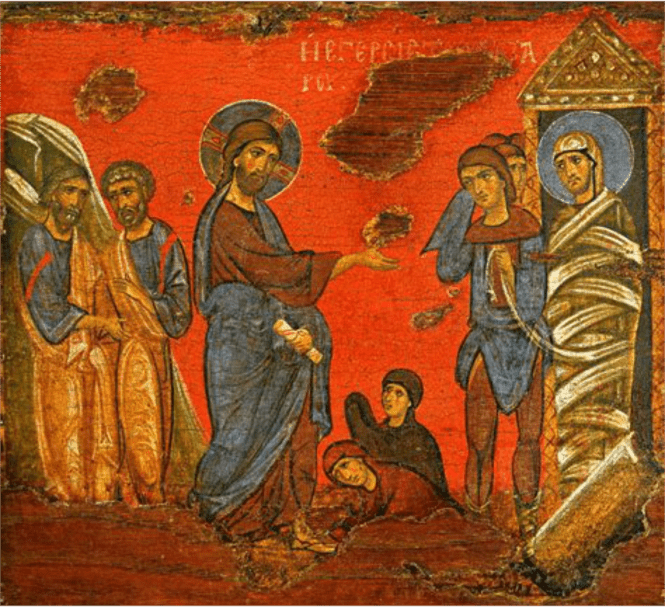This being Lent, we’re hearing a lot about death and loss. And the old joke about only six sermons in all of Christendom is largely true. Specifically, many priests and bishops will talk about the need to die to be reborn, particularly as the church continues its downward spiral.
The problem is that many preachers have an odd view of death.
For example, one priest I know waxed rhapsodic about how her parish, having seen a 40 percent decline in pledges during the pandemic, has now returned to pre-pandemic levels of pledging. (I didn’t mention to her that, factoring in inflation, she had still lost about 32 percent of her budget over the last ten years. Trying to be tactful.)
But even during the downturn, her parish continued. Lights stayed on. Bills got paid. She drew her full salary.
In other words, her parish didn’t die. It had the equivalent of a really bad case of the flu, but it didn’t die. And what doesn’t die can’t be resurrected. Maybe brought to life, yes. But it can’t return to life.
That contrasts with the story of Lazarus.
In the Lazarus story, Jesus, torn by grief, goes to the tomb of his dead friend, Lazarus. With him is Lazarus’ sister, Mary. And while it’s not expressly mentioned, it seems that others joined them, for Jesus commands those present to remove the stone from the entrance to the tomb,
Right about now, we can envision the look on Martha’s face. She’s confused, appalled, and distraught. Reason collides with faith. And she’s just not feeling it.
So Martha, not knowing where this is heading, objects: “Martha, the sister of him that was dead, saith unto him, Lord, by this time he stinketh: for he hath been dead four days.” John 11:39 KJV.
In other words, Lazarus is dead. Really dead. He smells bad, and Martha doesn’t want to experience what she thinks comes next.
Of course, we know what comes next. Jesus prays to the Father, then commands Lazarus to come forth from the tomb.
Lazarus is resurrected!
So what does this mean for us?
It means that, in order to be resurrected, we must die. But that doesn’t just apply to our physical bodies.
It applies to the spiritual rebirth and renewal. It applies to the church.
There is little doubt: The old Episcopal Church, bastion of white, wealthy, educated people, is dying. Many of our churches, with no insulation and massive carbon footprints, are emptying. Our privileged clergy, who often enjoy total compensation packages not seen anywhere else, are less and less livin’ la vida loca. Bishop’s manses, often stately cribs right out of Gone With the Wind, are clearing out.
We grieve the loss of buildings and ways of doing things that are comfortable to us. We think of the Faith of Our Fathers, Living Still — while forgetting the faith of our mothers. We look with awe on beautiful stained glass and other artwork, even as much of it is vanishing.
In short, much of what we consider church is starting to smell. Not in a physical sense, but in the sense that it no longer aligns with our faith.
Will the entire Episcopal Church come tumbling down? We don’t know. Certainly, some endowed parishes will continue, no matter what.
But what we do know is that the head cold that many consider to be spiritual death in the Episcopal Church isn’t going to cut it. No doubt God can cure a head cold if it comes to it. But God won’t resurrect us based on a minor illness of this sort. We need to “stinketh.”
Within the next 20 years, a huge percentage of our relatively elderly congregations will die. Will there be people there to replace them?
The answer to that question largely depends on us. Will we reach out and invite our neighbors into community? Do we invite others to our social events? Do we offer to go to the gym with them? Grab coffee with them on a rainy and cold day and just listen?
Beyond that, do we push for change? Do we evaluate our actions by asking, “Is this building the Kingdom of God?”
Part of the dying process also involves asking hard questions. Does the church act justly? Often, the answer is no. Are we consistently kind? Many times, the answer is no.
The late bishop Barbara Harris put it well: “No one hates like Christians.” Are we willing to have hate die?
These tough questions extend to things. Is our church or cathedral consistent with our call to be gentle with this fragile earth? Often, the answer is no. And we will see many empty churches in the next 20 years.
And are we willing to call ourselves on the carpet? Among the church’s best friends are its critics, for they call us to account. They are the prophetic voices that call us forward. Without critics, we would still be a slave-owning society.
Nor should we kid ourselves. The Episcopal bishops who founded Sewanee were slaveholders and preached in favor of it.
Yet too often we condemn those who call us out. We call them troublemakers, toxic, threats, you name it.
But the opposite of love isn’t criticism. It isn’t even hate. It’s indifference.
May we go forth, not with indifference, but with love and passion. And while we do not not what to expect when the rock is removed from the tomb, let us trust in the power of God to resurrect us.


Leave a Reply